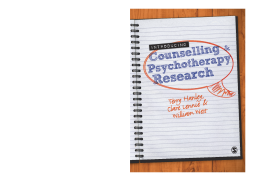
BOOK
Introducing Counselling and Psychotherapy Research
Terry Hanley | Clare Lennie | William West
(2012)
Additional Information
Book Details
Abstract
'An unusually thoughtful, methodical, engaging text tackling essential research issues in an accessible and attractive way' - Colin Feltham Emeritus Professor of Critical Counselling Studies, Sheffield Hallam University.
Introducing Counselling and Psychotherapy Research provides an accessible yet thorough overview of the place that research has in the world of therapy. It introduces the reader to the language of research and helps students to identify themselves as researchers by supporting the development of their research literacy and awareness. Structured around common training topics, the book provides:
- consideration of what research is and why people do it
- discussion of key issues that individuals should consider before embarking on a research project
- an informed overview of common research methodologies and methods
- a reflection upon the need to place ethical mindfulness at the fore of any research project
- advice and information on what you can do with your research once it's complete.
This practical book demystifies research through a model of collaborative and experiential learning, with training exercises, student reflections, further reading, guidance on how to complete a thesis or dissertation, study skills and tips on how to use research supervision and dissemination.
Terry Hanley, Clare Lennie and William West work as directors and lecturers on the Counselling and Counselling Psychology programmes at the University of Manchester.
This is an engaging, useful and readable introduction to undertaking research in counselling and psychotherapy...The constant yet subtle introduction of key concepts throughout the text make this a great introduction for those wishing to understand more about why research is important in this field.
Jo Pybis
'The authors of this very personal book seem to have really understood student anxieties about embarking on research. The whole project of getting to grips with research methods is brought alive through examples from the authors' own teaching of research methods. One of the inspired pedagogical methods is the use of debate to get students to articulate their approach and back this up from role played perspectives like that of a service commissioner. The reader is encouraged to adopt a critical stance in relation to the text, throughout, and the 'student voice' is used as a critical commentary.
The process of research is used as a model of collaborative and experiential learning, which makes this book very different from most of the research methods texts already 'out there'. The language of research is used throughout, in order to help students to begin to identify as researchers (e.g. 'your findings'; 'our findings'). This is set to become an essential part of every counselling trainer's reading list, serving as it does to demystify research and set learning through research firmly within counsellor training. My students will read it with relish' -
Bonnie Meekums, PhD,Lecturer in counselling and psychotherapy at University of Leeds
